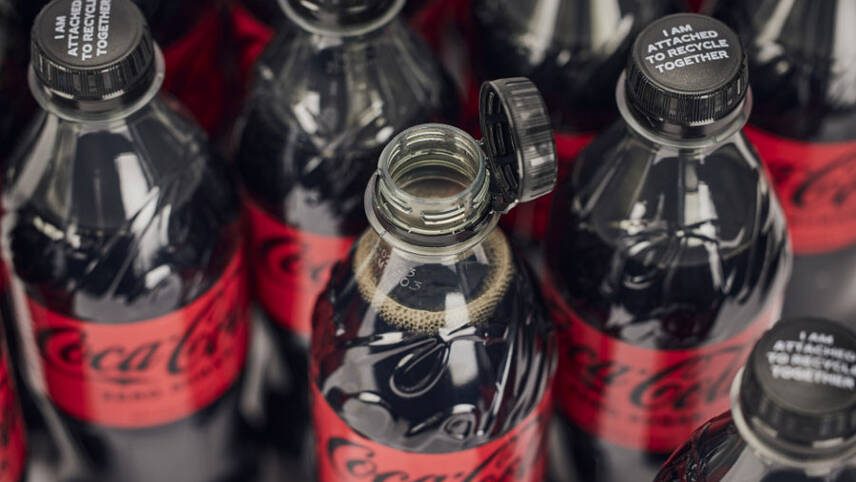Register for free and continue reading
Join our growing army of changemakers and get unlimited access to our premium content

Image: Coca-Cola European Partners
ClientEarth and EU consumer protection organisation BEUC have today (7 November) confirmed the filing of the legal complaint, made to the Europpean Comission and to the EU’s Consumer Protection Cooperation Network (CPC) of regulators. The complaint alleges a “suspected widespread infringement of consumer protection law” due to greenwashing.
The complaint argues that Coca-Cola, Nestle and Danone are misleading consumer by stating on many of their plastic beverage bottles that the packaging is ‘100% recycled’ and ‘100% recyclable’.
It states that customers are likely to see the latter of these taglines and assume that their bottle will certainly be recycled in a closed loop infinitely.
In reality, the EU-wide collection rate for PET bottles is around the 50% mark. Not all of these bottles will be made to create new, food-grade packaging.
The recycling rate for all plastic packaging in the EU is just under 40%. And, of all plastics produced globally to date, just 9% has been recycled.
On recyclability, whether a bottle is ‘100% recyclable’ will depend on where the customer purchases and disposes of it. Not all local authorities across the EU collect PET bottles from homes and not all workplaces and public spaces have recycling provisions.
Another issue with the on-pack claims observed by ClientEarth and BEUC is that the ‘100%’ claims frequently exclude bottle lids and labels and that this is not always clearly signposted.
Overall, the two bodies are concerned that consumers may view PET bottles as a ‘sustainable’ choice and choose them over refillable and reusable alternatives.
This is part of the reason that this cohort of businesses have not reduced their collective virgin plastic use rates.
In filing the complaint, ClientEarth and BEUC are hoping that policymakers will bring forward new green claims requirements that would put an end to a ‘wild west’ of claims relating to the circular economy. Requirements on credible on-pack claims on climate impacts are already being made stricter.
ClientEarth plastics lawyer Rosa Pritchard said: “Of course, where waste can be recycled, consumers should keep up their good work. Recycling is less harmful than other disposal methods, such as incineration or landfill. But it is important companies don’t portray recycling as a silver bullet to the plastic crisis – instead they need to focus efforts on reducing plastic at source.
“Companies are in a unique position to change how we consume, but currently these claims – which we consider to be misleading – are making it hard for consumers to make good environmental choices.”
Brand responses
The Coca-Cola Company has pledged to make all of its packaging recyclable globally by 2025 and to use recycled options for at least half of its packaging by weight by 2030. It is also aiming to support the collection and recycling of a bottle or can for each one it sells by 2030. Additionally, there is a target for 25% of drinks volume sold globally to be in refillable packaging by 2030.
These targets are often criticised by environmental groups given the company’s historic expansion of single-use plastic packaging production.
A Coca-Cola spokesperson called these goals “ambitious” and said the company “knows more must be done” to “help eliminate waste”.
Regarding the legal complaint specifically, they said: “We only communicate messages on our packaging that can be substantiated, with any relevant qualifications clearly displayed to enable consumers to make informed choices. Some of our packaging carries messages to drive recycling awareness, including whether our packages are recyclable and if they are made from recycled content.”
Nestle is aiming for 100% of its plastic packaging technically reusable or recyclable by 2025, up from 85.8% in 2022. Recyclability is the key focus for most product formats. It is also planning to scale its use of recycled content from 36% in 2022, to support a target to reduce virgin plastic use. Specific percentages for just Nestle Waters are not listed on the corporate website.
A Nestle spokesperson said: “We work hard to reduce the amount of plastic packaging we use; to lead investments and support packaging circularity alongside partners, and to communicate clearly with consumers who want to make informed choices. Nestle has reduced its amount of virgin plastic packaging by 10.5% since 2018, and we are on track to get to one-third less virgin plastic by the end of 2025.”
Danone claims that around half of its water sales worldwide, by volume, were housed in reusable packaging in 2021. Across its entire plastic packaging portfolio, 74% is reusable, recyclable or compostable. It is aiming for 100% by 2025.
Earlier this year, ClientEarth filed a case with France’s equivalent of the High Court against Danone. It is aiming to force additional plastics disclosures from the company.
A Danone spokesperson told edie: “At Danone, we strongly believe in the circularity of packaging – and will continue to invest and lead the campaign for better collection and recycling infrastructure alongside our partners. We have also made real progress on our journey to reducing single-use plastic and virgin plastic use in parallel.” The spokesperson cited a 10% decrease in single-use, virgin plastic production since 2018.”
More broadly, a statement has been issued by trade bodies Natural Mineral Waters Europe and UNESDA Soft Drinks Europe criticising the legal claim. You can read that statement in full here.


Please login or Register to leave a comment.